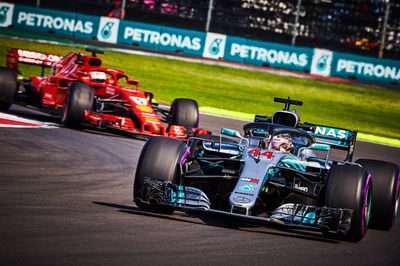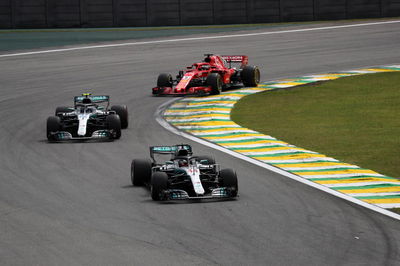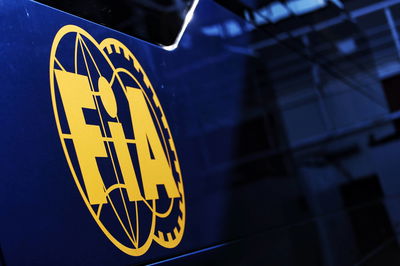Will F1’s fastest lap bonus point make a difference?
A number of Formula 1 drivers have aired doubts over the impact the return of a bonus point for setting the fastest lap of the race will have through the 2019 season.
F1 confirmed on Monday that it would be reintroducing the fastest lap bonus this year after last using the rule in 1959, with one point being awarded so long as the driver setting the fastest lap finished inside the top 10.

A number of Formula 1 drivers have aired doubts over the impact the return of a bonus point for setting the fastest lap of the race will have through the 2019 season.
F1 confirmed on Monday that it would be reintroducing the fastest lap bonus this year after last using the rule in 1959, with one point being awarded so long as the driver setting the fastest lap finished inside the top 10.
The move is intended to add more incentive for drivers to push in the closing stages of races, with the 21 extra points potentially on offer across the course of the season.
Had the rule been in place last year, Valtteri Bottas would have been the only driver to improve his final championship position as a result. The Finn ended up fifth in last year’s standings, but would have risen to P3 with six bonus points for fastest laps.
“It would have been nice to have it last year…” Bottas said on Thursday in Melbourne. “I would have got quite a few extra points, I think it would have been enough to finish third in the championship.
“But once we know the new rule, now everyone can create some differences on the way the race will go. If, for example, you have a free pit stop close to the end of the race, you might go for it and try to do a quick lap at the end of the race.
“But if you’re fighting for the win or the podium, that will take a second role in what you’re focused on. It’s just one more thing to make things more interesting.”
Bottas’ belief was not one widely-shared throughout the F1 paddock though, particularly among drivers racing for the midfield teams.
Through 2018, it was common for the drivers towards the back of the Ferrari-Mercedes-Red Bull battle at the front of the field to pit late on without losing a place given the deficit to the midfield runners, take a fresh set of tyres, and set the fastest lap.
Out of 21 races, 20 of the fastest laps were set by drivers from the top three teams. The only exception came in Singapore, when Kevin Magnussen set the fastest lap for Haas (albeit finishing 18th, so he wouldn’t have been eligible for the point anyway).

Magnussen’s teammate, Romain Grosjean, highlighted the issue when asked about the bonus point, saying it was only for “the top teams”.
“For the midfield, I don’t see it changing a lot,” Grosjean said.
“If you look at the stats for the last three of four years, 96 percent of the fastest laps have been done by the top three teams.
“Normally the top three teams they pull away and have a free pit stop anyway, so if you are the last of that leading group, then you have a free pit stop anyway with the midfield.
“But when you take a pit stop there is always the risk that the wheels are not on tight!” he added, referencing Haas’ errors at last year’s Australian Grand Prix.
Grosjean’s concerns were shared by Sergio Perez. “I think the tricky bit comes that someone out of the top 10 can take it from you,” Perez said. “I hope this year is a bit different, but for example last year, Red Bull was always far from the top two teams and far from the rest of the grid, so they could have gotten the points very often but we’ll see.
“I think let’s see for the first couple of races how the way it pans out and then we’ll make up our minds.”
Robert Kubica was more deadpan about the prospect of the bonus point for Williams: “I think unfortunately it doesn’t affect us a lot, at least for now…
“But an extra point you can unlock some strange scenarios at the end of the race with some cars speeding up and it will open up with three or four cars coming in. It will depend if it will have a domino effect. But as I said, we are not really interested about it yet.”
Daniel Ricciardo agreed with Kubica that there could be something for the front-runners to lose, creating an element of risk: “It’s good they’ve at least restricted it to the top 10, so you do have something potentially to lose if you go in to pit for a fresh set of tyres to get the fastest lap.
“I don’t think it will decide a championship. It could do, but I don’t think it will.”
For any driver to rack up a sizeable chunk of the 21 bonus points on offer this year would be impressive – but it’s something particularly for the title protagonists of the past two years, Lewis Hamilton and Sebastian Vettel, to factor in when approaching their races.

Strategies that have an extra stop that afford a short stint on low fuel and the softest tyre compound near the end of the race become slightly more valuable – even for just a four percent bonus on top of a race-winning points haul.
“It’s 21 extra points, so I think it will be interesting to see how people try to get those points,” said Hamilton.
Vettel, however, was more sceptical: “I don’t expect much change. We’ll see after a couple of races if there actually is a change.”
There are a number of questions that need answering in Australia this weekend – but the effect of the fastest lap bonus will only get a partial resolution. Chances are the man running P1 isn’t going to pay a huge amount of attention to a single bonus score.
Only later in the year, when the title permutations become clearer, will this dynamic change. And that could be when the real worth of this rule change begins to show.
Additional reporting by Michael Lamonato.











